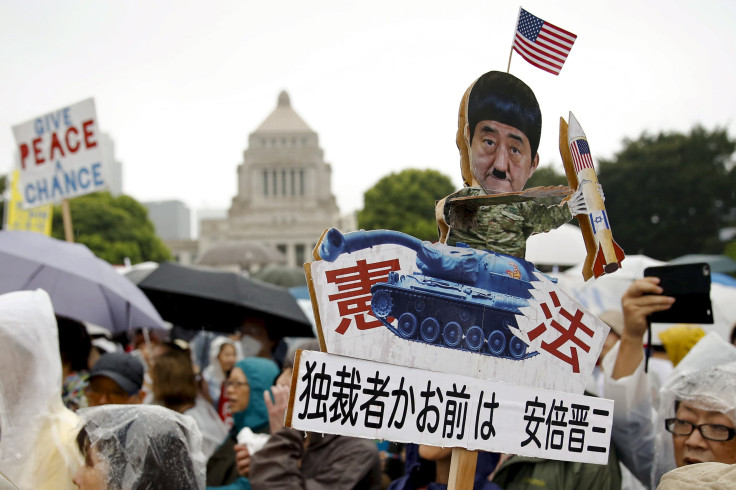Tokyo Protests Shinzo Abe's Security Reforms

Thousands of people gathered in Tokyo Sunday to protest a legislation drafted by Japan’s Prime Minister Shinzo Abe that would expand the country’s military freedoms, allowing its troops to fight overseas.
In a massive demonstration that organizers estimated at about 120,000 people, protesters stood in front of Japan’s parliament building bearing placards reading “Reject the War Bill Now!” and “We’re Against War, Kill the Bill!” according to Bloomberg.
The Tokyo rally was one of more than 300 across Japan this weekend against the legislation that would expand the pacifist country’s military capabilities.
"We need to make the Abe government realize the public is having a sense of crisis and angry. Let's work together to have the bills scrapped," Katsuya Okada, head of the opposition Democratic Party of Japan, said at the Tokyo rally, according to Reuters.
Under Japan’s current pacifist constitution, drafted by the U.S. after the country was defeated in World War II, Japan renounced its right to wage war, and can only maintain Self-Defense Forces, which have not killed a single person in the country’s 63 years of independence.
Abe in July pushed through the legislation that let Japan’s armed forces come to the defense of an ally under attack -- a drastic shift away from Japan’s previous post-war security policy. The bills are now in the country’s upper chamber, and Abe’s supporters are trying to push it through before the parliamentary session ends Sept. 27.
Critics fear that the reinterpreted policy could see Japan entangled in foreign wars in the Middle East and elsewhere as Tokyo supports its U.S. allies. Washington has praised Abe’s proposed changes, which come at a time when the U.S. is stepping up its own military presence in the region in response to an increasingly assertive China, which has frequently entered diplomatic and territorial disputes with its neighbors.
The two countries also agreed on new defense guidelines in April that expand their military cooperation in several areas, including missile defense, cyber and space attacks, and maritime security.
The measures have proven to be deeply controversial among the Japanese public, and Abe’s approval ratings have suffered as a result. In July, his approval ratings fell below 40 percent amid widespread dissatisfaction with the country’s economic recovery and Abe’s policies.
“Support for the security bills is unfortunately weak,” Abe said in July. “This tough result probably comes because understanding has not progressed.”
© Copyright IBTimes 2024. All rights reserved.





















